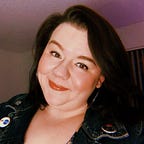Why We Write: Z
Week five of Why We Write features thoughts from Z. We’ll be sharing a new Why We Write piece every week, learn more about how to contribute here.
Keep writing and keep fighting. We’re here for you.
I have a thing about loud noises, and the world is loud. You can see the problem. Eight billion people and counting, restlessly hunting for their daily bread while a small percentage of them hide the grains in a silo; it makes for a loud, restless, angry world. I wasn’t supposed to be in this world for long — I got sick around the third day and the hospital, as is typical of Eastern Bloc hospitals, was not equipped for it. My parents happened to know a neurosurgeon who was willing to put in the shunt and drain the errant fluids pressing against my brain.
I got through it and a decade of seizure medications before we showed up in Philly, expecting a reunion with my uncle who, in a feat of bad timing, died days before our plane landed. His kid said he’d take us in but as is usually the case, proclaiming to care about people is easier (and about as effective from your ego’s standpoint) than the actual act of caring, so he kicked us out after a while. I don’t remember a whole lot from that period except that Donna, my aunt, would buy groceries and write Post Its on it telling us not to eat it. I didn’t speak any English at first, but I picked it up mostly at school and from what I remember, mostly writing. People are loud, remember? So I wrote and read and over time (stop me if you heard writers say this before) I found it more comfortable than to be around people.
High school was a drag, a little north Appalachian coal mining town that had all the coal taken out of it, leaving behind white kids with nothing to do — tiny accented disabled Jewish kids weren’t exactly at the top of the pecking order. The disability thing wasn’t made official until later when a Russian friend said I should get tested. I had no idea what he meant. I didn’t know what a learning disability was, but I had it. I was told I had problems with spatial orientation as if this was a revelation — as if half the reason for my move to New York wasn’t because it is a grid city where I could orient myself more predictably than in an average American suburb with winding streets named after flowers and varieties of nuts.
Michael Chabon called the world we live in the gap between heaven and earth, between the ideals and the ground. Or, if you wanna go back half a century, you can take the word of Tom Lehrer who advised us that “I always found that ideals don’t take the place of meals.” How very true that is. And perhaps in no place is it truer than in my latest adopted hometown. In many ways, New York is a blessing. I used to be asked where I was from three times a week at least. I went to college down south, and spent a semester working in a state legislature where, at the time, a bust of the founder of the KKK loomed over us. History you know and present, but that’s rude to talk about, and the South doesn’t do rude, it does oppressive.
New York does rude. We like to think that rudeness is synonymous with honesty, but of course that’s far from the case. No place is more filled to the brim with cockroaches in suits, three-card monte players with masters degrees. Still there is a certain honesty to the way life is here. There is no pretense of concern or religiosity or deep tribalism (puking green beer once a year doesn’t cut it.) New York is a refugee town. New York is the place for Muslims fleeing India, white kids with piercings fleeing Iowa, and casino owners fleeing indictments. There is something precious about that, and it is something to be more prized as the world gets angrier and meaner — stinging from the betrayal of being told that if it fought just a little bit harder, worked a little bit longer, it too could have some crumbs from the master’s table. Most people in New York don’t believe this and don’t even pretend to. They see the world as the disorderly madhouse it is, not the well mannered 18th century workhouse Paul Ryan would like to turn it into. There’s a freedom and honesty in that — and sometimes you can write about it.
Z lives in…..oh guess. He can be found on Twitter, which is a bit of an out of body experience: @IRBroadshow.
Thanks to Z! We’ll see you next week!
